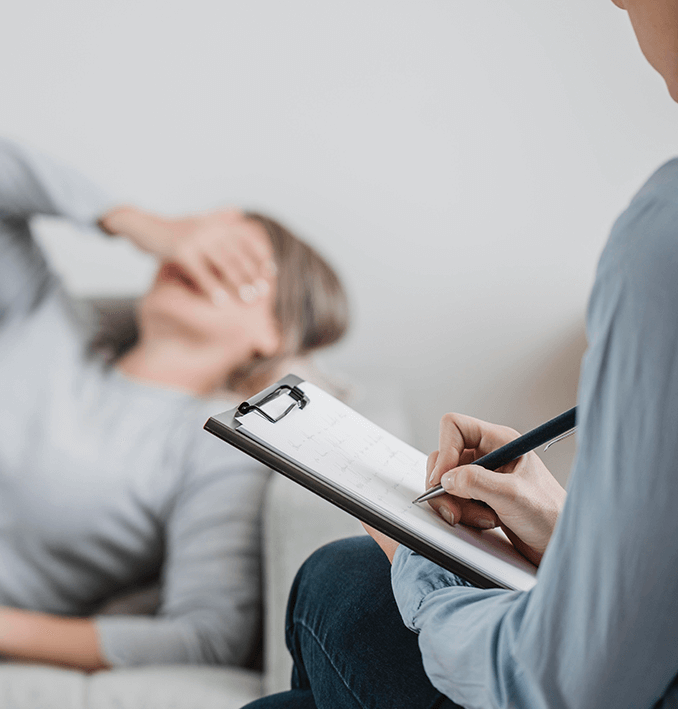Some people assume obsessive-compulsive disorder (OCD) is simply about being concerned about neatness and having a strong desire for organization. However, such a view is a common stereotype, and this condition is more complex.
The Diagnostic and Statistical Manual of Mental Disorders outlines OCD symptoms as the presence of recurrent and persistent intrusive thoughts (obsessions) coupled with repetitive compulsive rituals as a response to these thoughts. Both obsessions and compulsions are time-consuming and evoke intense feelings of anxiety or distress.
Still, there are many ways to treat OCD and cope with its symptoms better. They include psychotherapy, medication, and lifestyle changes, often utilized in combination. Read on to learn more about them.
Talk Therapy for OCD
Psychotherapy, or talk therapy, is one of the most common methods used to treat obsessive-compulsive disorder. It provides a supportive and non-judgmental space to explore and talk about thoughts, emotions, and behaviors. A psychotherapist or a psychologist can help you become more mindful, identify your obsessions and compulsive actions, and learn strategies to cope with them.
Three main types of psychotherapy have shown efficacy in treating OCD: cognitive-behavioral therapy, exposure and response prevention therapy, and acceptance and commitment therapy. Let’s review them in more detail.
Cognitive-behavioral Therapy (CBT)
Exposure and Response Prevention Therapy (ERP)
During the course of sessions, patients are gradually exposed to situations, thoughts, objects, or images that trigger obsession in their minds. They also perform specific exercises that help tolerate tension and anxiety without using rituals. This process weakens the cycle of obsessions and compulsions step by step.
Acceptance and Commitment Therapy (ACT)
Acceptance and commitment therapy (ACT) is a mindfulness-based approach. It can help individuals come to terms with their uncomfortable thoughts and feelings rather than trying to waive them off or control them.
The main goal when
Medication for OCD: What Can Be Prescribed?
Medication is usually considered when the symptoms of OCD are moderate to severe and psychotherapy seems to not be effective enough. The most commonly prescribed medications for OCD treatment are the following:
- Selective serotonin reuptake inhibitors (SSRIs). SSRIs are commonly used as a part of first-line treatment in
combination with CBT[4] . These medications impact the transmission of signals in the brain; they help increase serotonin levels and thereby alleviate OCD symptoms. Examples of SSRIs prescribed for OCD include fluvoxamine (Luvox), fluoxetine (Prozac), and sertraline (Zoloft). Clomipramine[5] . It was the first FDA-approved medication for OCD. It belongs to the class of tricyclic antidepressants and increases the amount of both serotonin and norepinephrine in the brain.- Atypical antipsychotics. Sometimes, monotherapy does not help to the necessary extent. This is where
atypical antipsychotics[6] can be prescribed to enhance the effects of treatment. Common examples include risperidone (Risperdal), aripiprazole (Abilify), olanzapine (Zyprexa), and quetiapine (Seroquel).
Choosing the Right Medication
Many treatments are available for OCD, and it’s important to choose the one that will suit your health needs. The choice of medication depends on various individual factors, including the severity of symptoms, response to previous treatments, co-existing conditions, and potential side effects. It’s important to discuss all the details of your health history with a healthcare provider to find the most suitable medication and dosage.
Risks and Side Effects of Medications for OCD
Like all medications, the ones prescribed for OCD have potential side effects. Some are common and minor, resolving over time, while others can be more severe, requiring discontinuation and the choice of another medication.
SSRIs may cause agitation, anxiety, nausea, sexual dysfunction, diarrhea, constipation, headaches, and insomnia. Clomipramine has a higher incidence of side effects compared to SSRIs, so using it requires extra caution. Common reactions include dry mouth, constipation, weight gain, sedation, blurred vision, and low blood pressure. Atypical antipsychotics may cause side effects too, including drowsiness, mood swings, sexual dysfunction, and weight changes.
It’s important to follow the recommended treatment for OCD precisely to avoid adverse effects. Also, remember to communicate any concerns and side effects to your healthcare provider. It will help to find a treatment that has more benefits than potential risks.
Interactions With Other Substances
Medications may interact with other medicines, over-the-counter supplements, and specific foods:
- SSRIs: Non-steroidal anti-inflammatory drugs (NSAIDs), antiplatelet agents, monoamine oxidase inhibitors (MAOI), tricyclic antidepressants, theophylline, lithium, and triptans.
- Clomipramine: Monoamine oxidase inhibitors (MAOI), fentanyl, tramadol, lithium, buspirone, warfarin, digoxin, and phenobarbital.
- Atypical antipsychotics: Benzodiazepines, antihypertensive drugs, and anticonvulsant medications.
It’s also not recommended to consume large amounts of caffeinated drinks such as tea, coffee, cola, and energy drinks. Finally, restrict alcohol use as it may increase drowsiness and make the symptoms of OCD worse. Note that the above list is not exhaustive, and potential interactions may vary for different medications, so consult your physician to learn more.
Other Treatment Methods for OCD
In addition to the traditional treatment approaches discussed above, your healthcare provider may recommend alternative options. It may be an appropriate decision if you don’t respond well to the chosen treatment options, have a severe form of OCD, or just want to support the effectiveness of your treatment plan.
Support Groups
Even while receiving the most effective treatment for OCD, patients with this mental health condition may need support from other people going through similar challenges. Studies indicate support groups are a helpful tool for those with OCD: people can share experiences and provide each other with valuable self-help methods. Support groups can also help distract you from worries, reduce feelings of loneliness, and create a strong and accepting social environment.
Stress Management
Stress may sometimes
- Mindfulness techniques such as meditation and progressive muscle relaxation.
- Deep breathing exercises and other relaxation techniques.
Physical activities[8] such as walking, yoga, swimming.- Maintaining a healthy diet.
- Quality sleep.
Deep Brain Stimulation (DBS)
Transcranial Magnetic Stimulation (TMS)
Transcranial magnetic stimulation (TMS) is
Conclusion
OCD requires a comprehensive treatment plan, potentially including a combination of methods. Some people may benefit from counseling while others need pharmacological treatment or a combination of several interventions. At MEDvidi, you can receive a personalized plan based on your symptoms, health history, treatment goals, and other factors.
Take a step today: connect with a licensed healthcare provider from the comfort of your home.
FAQ
Can OCD ever go away?
Sometimes, even the most effective treatments cannot eliminate intrusive thoughts and compulsions completely. Still, in most cases, medications, psychotherapy, and alternative techniques significantly improve symptoms. During long-term professional treatment, you can also learn beneficial self-help skills and strategies to cope with OCD symptoms whenever they arise.
What happens if OCD is left untreated?
If OCD is left untreated, it can lead to worsening symptoms, so that they start interfering with usual daily life, including work and relationships. It may also result in the development of other mental health conditions, such as depression and anxiety disorders, and increase the risk of suicidal thoughts and substance abuse.
Can you fully recover from OCD?
The chances for full recovery from OCD are different for each person. Some may improve their symptoms significantly, while others may have a more persistent condition. It’s important to understand that full recovery doesn’t mean getting rid of all obsessive thoughts completely. It means learning to manage and lessen the impact of these thoughts on daily life. Also, note that early diagnosis typically increases the chances for successful treatment.
Can you treat OCD by yourself?
Self-help techniques may be helpful for those with mild symptoms or as an addition to psychotherapy and medications. However, it is advised to get treatment for OCD through a licensed healthcare professional who can create a personalized comprehensive plan covering even minor manifestations.








